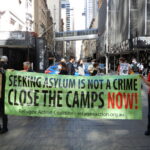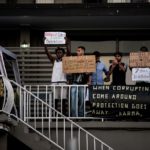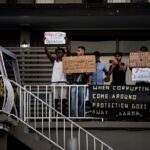Stop Handcuffing Refugees: An Interview With Doctors for Refugees’ Patrick Lukins
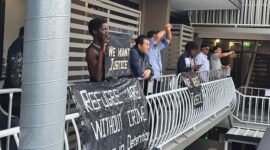
On top of all the other brutality successive federal governments have been meting out upon refugees and asylum seekers who arrived in Australian waters by boat, it’s also required that these detainees are handcuffed whilst being transferred from a facility to a medical appointment.
Refugees and asylum seekers being held in immigration facilities aren’t in detention for committing any crime. Rather, these are innocent people who have come to this country legally under international laws that our nation is a party to.
But as Australian governments have specifically decided to single out asylum seekers arriving by boat for mandatory and indefinite detention, these people are now locked up in facilities like they’ve committed some serious criminal offence.
The reason refugees are legally permitted to come to Australia is because they’re fleeing a hostile environment in their countries of origin.
So, to then parade them around in handcuffs when they’re going to see a doctor is not only degrading and inhumane, but it can also be retraumatising.
Ever-increasing force
The Public Interest Advocacy Centre has noted that since the Australian Border Force took control of the onshore immigration detention system in 2015, there has been a significant militarisation of these facilities, along with a marked increase in the punitive measures being applied in them.
Indeed, the Commonwealth Ombudsman and the Australian Human Rights Commission have released reports addressing the excessive use of force now being used in immigration detention centres, with both having specifically called out the practice of handcuffing medical transferees.
A case contesting the practice of handcuffing refugees for medical appointments has just been launched by the Public Interest Advocacy Centre in the Federal Court. It involves an asylum seeker who’s spent seven years in detention and has repeatedly been traumatised via the use of cuffs.
The ABF recently told the ABC that it approves of the use of handcuffs when it’s determined there’s a potential risk. This assessment is evidently conducted with input from medical professionals and the risks of trauma are supposedly taken into account.
However, critics advise that this isn’t what’s actually happening on the ground.
The right to refuse
Doctors for Refugees released an open letter in November calling on other medical professionals to stand up against this practice. It states that the process of risk assessment being used by the ABF and Serco is “obscure”, and the use of cuffs has a “deleterious effect” on the mental health of patients.
The letter also points out that the former offshore detainees that were transferred here to receive medical treatment, under the now defunct Medevac laws, are subject to this practice as well. And this is despite thorough security checks having been carried out prior to their being transferred.
NSW registered paramedic Patrick Lukins recently refused to transfer a detainee until Serco guards agreed not to cuff him. Sydney Criminal Lawyers spoke to the Doctors for Refugees member about his calls for other paramedics to do the same.
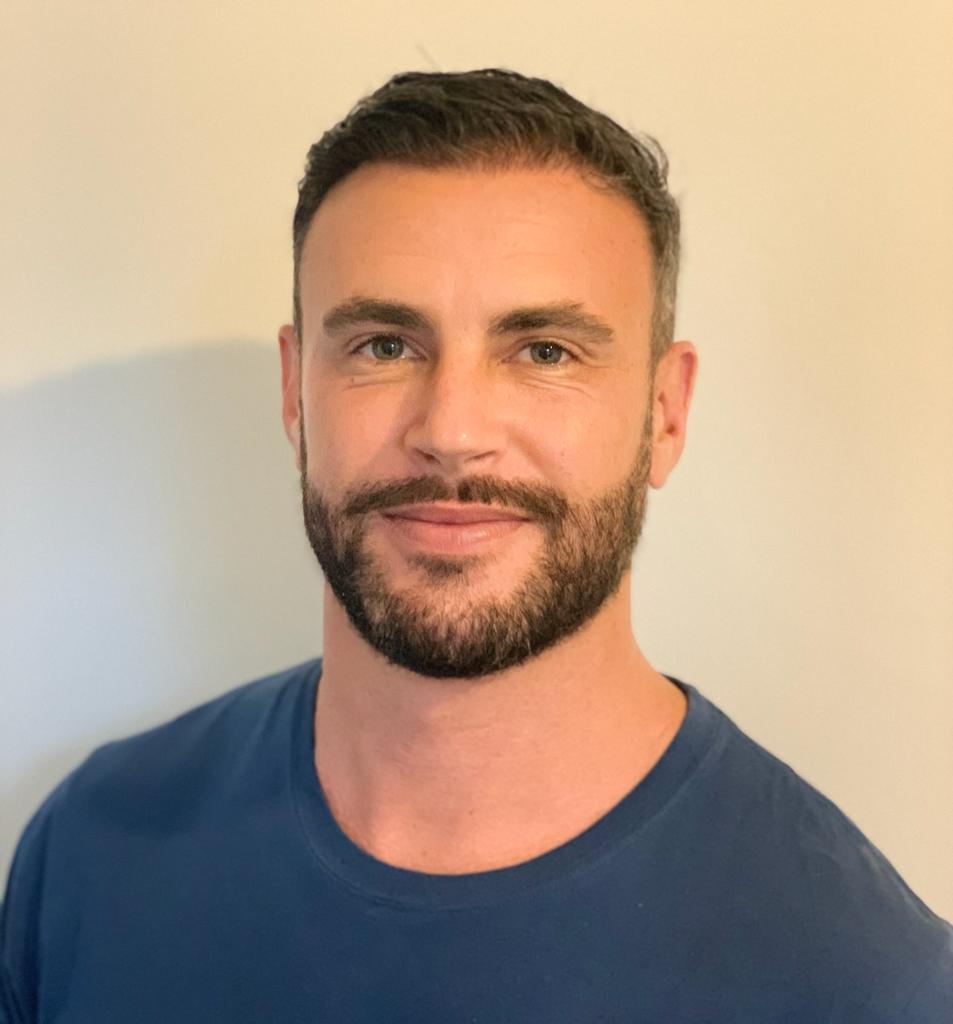
Firstly, you were called out to Villawood Immigration Detention Centre recently in order to transfer a refugee detainee to a hospital to receive medical treatment.
At the time, you refused to go ahead with the transfer until the Serco guards agreed not to place handcuffs on the detainee’s wrists.
Patrick, what actually happened?
The patient had a chronic condition, and he was having acute symptoms relating to it.
The detainee told me he’d had the symptoms all day, but he had to wait a few hours, and ask a few times, before he was allowed to access medical staff at the centre.
We assessed him and found that he needed to go to the hospital. We informed the guards of this. And then we had to wait about half an hour while they assembled enough guards to escort the patient to hospital.
So, he was sitting there on our stretcher on monitoring equipment during this time. And we were getting a little frustrated about how long it was taking.
Management then informed me that this patient was at risk of absconding. When I asked why they said that it was because he’d said he wanted to put his shoes on, get his mobile phone, and he’d also been asking which hospital we were going to.
I said that is 99 percent of our patients, and that it’s not really unusual. I asked if there was anything specific that the guards could tell me about why he would need handcuffs: if there was a threat or he’d been violent in the past. But they said there wasn’t.
So, based on this and the reports of the medical staff, I determined he was low risk. And I said that there was no need for him to wear the handcuffs.
They then tried to apply them anyway. And they asked me to remove my monitoring equipment that goes on a patient’s writs.
I told them I couldn’t, because I’d told them I didn’t want the handcuffs on as it was going to impede my ability to treat my patient and it was a health issue.
This was met with some resistance. And after a bit of debate, the manager said that he would have to get approval.
So, what they ended up doing was they didn’t put the handcuffs on, but then they sent for another guard.
We then had to wait another 10 to 15 minutes for a fifth guard to come. The patient was then escorted with five guards, rather than the four they had originally planned.
I was told not to tell the patient which hospital we were going to, which is unethical.
The patient was really grateful. He said nobody had ever stood up for him like that before. I was happy about that, but I was shaken by the confrontation.
It was a difficult thing to do, especially when you’re in their environment and it’s their rules.
From your position what was the issue with taking the detainee whilst in cuffs? Indeed, why is the handcuffing of asylum seekers and refugees being transported for medical reasons a problem?
It’s pretty simple. Paramedics don’t routinely restrain patients. We first determine if there’s a risk, and if there is, we use a stepped approach. Restraints are always the last resort.
If anything, the detainees are much less of a risk than the general patients we pick up, because we have the benefit of background information on them, which is unlike any patient we pick up on the street. We don’t know anything about them.
There’s also a minimum of three guards with any patient transferred. So, if three guards can’t keep an eye on one patient, then they don’t need handcuffs, they need better training.
And to answer the second part of the question, there are a few reasons why it’s a problem. Handcuffs are quite brutal when applied, so they may exacerbate any existing injury.
The mere threat of handcuffs may result in asylum seekers and refugees not seeking help for their medical problem in the first place.
If I knew I was going to be shackled when visiting a GP, then I wouldn’t bother getting a script.
Then there’s the mental strain that being handcuffed causes patients. I’ve had experiences with detainees asking me to cover their hands as they enter a hospital because they’re embarrassed of being paraded down the corridor.
Being flanked by guards and in handcuffs while they’re seeking help for either a medical or mental health condition can be off-putting.
It’s also against our code of conduct. We’re supposed to treat all patients equally and advocate for a safe and supportive environment, and handcuffing is the opposite of that.
What’s the position of the Australian Border Force and Serco in regard to handcuffing refugees and other immigration detainees?
There’s no specific policy. They do mention that they need to handcuff detainees who are high risk. But the system they use to determine who is high risk is unclear.
They seem to make up their own rules in the detention facility, as handcuffs are commonplace there.
But when it comes to medical transfers, the power is in the hands of the treating medical officer as a health concern, and that should overrule any obscure policy they do have.
As you said, you had to argue your point before the Serco guards allowed transfer without cuffs. What would you say this resistance tells us?
It was a difficult confrontation to have. I felt outnumbered and I felt like the enemy when all I was trying to do was look after the patient.
There are a lot of factors at play. In some respects, I can see Serco’s point of view, because they don’t want to have a detainee abscond on their watch.
But, unfortunately, this creates an environment where detainees are treated as a security threat and not a human.
Border Force are also to blame for paying a private contractor to run a facility, which has the control over the lives of people, and these are the most vulnerable people.
This isn’t like a school tuckshop contract. We’re talking about life and death.
I have colleagues that have been to hangings at Villawood. There are untold stories of suicide and self-harm within that facility. So, there are a lot of factors at play here.
Despite being given a thorough background check before being brought to Australia, the Medevac detainees have been handcuffed when being transferred for medical treatment and other reasons.
A number of these detainees have just been released into the community in Melbourne. What are your thoughts on the plight of the Medevac refugees, and on the release of only some, while others continue detention?
It’s good to see that some people have been released, but I can’t say that I’m really that happy about it. They shouldn’t have been locked up for that long in the first place.
If anything, it makes me sad that they were ever put in that position. The damage done to these people via indefinite detention – many of whom already have complex and traumatic backgrounds – is immeasurable.
Medevac laws were introduced to give professionals more say in the health needs of offshore detainees, which makes sense: health issues should be determined by health professionals.
The government has not only repealed these laws, but it’s also used human lives to make a political point, which is despicable.
The fact that some of them are being released while others are left to languish only highlights my point more: the government doesn’t give any thought to the ongoing suffering of people who came to Australia for protection.
They have been held in an offshore prison against UN law, and they’re now being punished for seeking medical attention. So, I’m not particularly happy about it.
In your understanding, what are the reactions of other medical professionals when it comes to these handcuffed patients? And what is Doctors for Refugees calling on paramedics to do when confronted by this situation?
Doctors for Refugees is a group of medical professionals: doctors, nurses and paramedics.
We all advocate for the same thing: the right of refugees and asylum seekers to have access to healthcare, and to be treated with dignity and respect when they do.
Through the work that I’ve been doing for Doctors for Refugees, I’ve been approached by other paramedics, who had stories to tell about their negative experiences with Serco, and how they felt uncomfortable about their patients being handcuffed.
Most weren’t aware that they had the right to advocate for the removal of the handcuffs. And they kept asking me one question: what should they say to the guards if they don’t want their patient handcuffed?
So, there seems to be a feeling out there that they don’t want their patients handcuffed, but they don’t have the power to stop it.
Paramedics are at the mercy of a punitive system when our priority is actually the health and wellbeing of patients. It’s a big moral conflict.
Doctors for Refugees are encouraging paramedics to advocate for what’s in the best interests of their patients.
Ultimately, what we are working towards at the management level is to come to some sort of agreement with Serco about changing the practice.
Then paramedics won’t have to have a confrontation with the guards every time.
We’re looking to make a change to the practice, rather than paramedics having to create the change at the coalface.
And lastly, Patrick, this policy is currently being tested in the Federal Court by the Public Interest Advocacy Centre.
In your understanding what does this case involve? And is Doctors for Refugees expecting this practice will soon be a thing of the past?
It’s an interesting case and I’ll be watching it closely. It’s a landmark case against the government’s routine use of handcuffs for medical treatment.
An asylum seeker has launched the action claiming that he was unlawfully handcuffed while in detention.
The point that he makes in his claim is exactly what I’ve been talking about, which is when a person has come to Australia to gain protection from a brutal past, and they’re facing the choice of being restrained or missing a medical appointment, they may choose to miss it.
Apparently, the government was given specific medical recommendations relating to this patient, saying that he shouldn’t be handcuffed because it causes seizures, but this was ignored and he was handcuffed anyway. So, his argument is it was unlawful.
The point I want to make to other registered paramedics, is that this case is testing something that hasn’t been tested before, which is restraining someone against advice is not only unethical, but it could be unlawful.
So, we all need to be careful as medical professionals, that we are not unlawfully detaining somebody and depriving them of their liberty.
It could come back on us. Apart from a whole moral and ethical side to it, there could be a legal side too.
Doctors for Refugees are working to make this practice a thing of the past.
But it’s people like this brave asylum seeker – who has taken the fight to the courts despite everything he has been through – that will make the real change. So, good on him.


